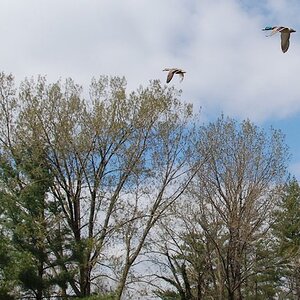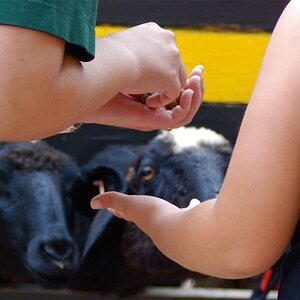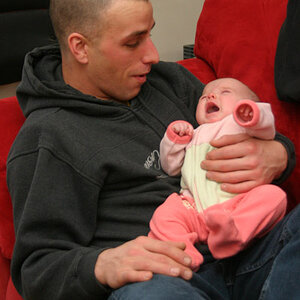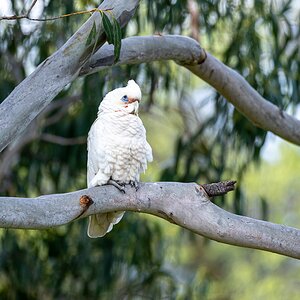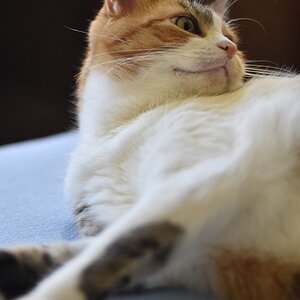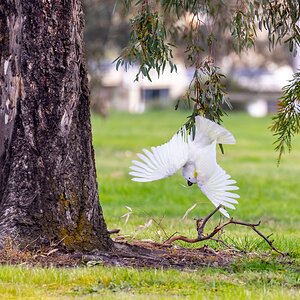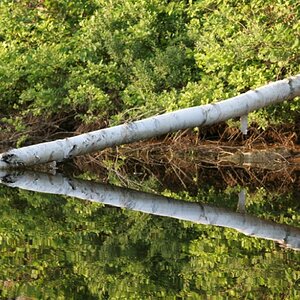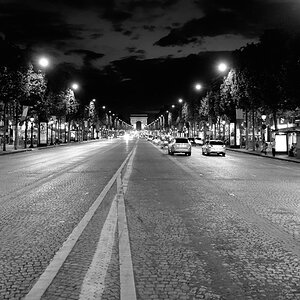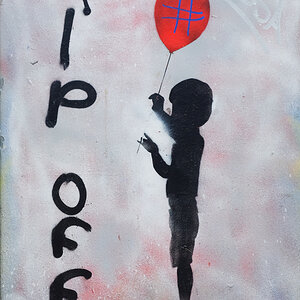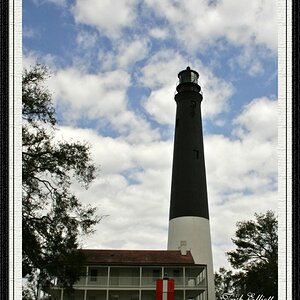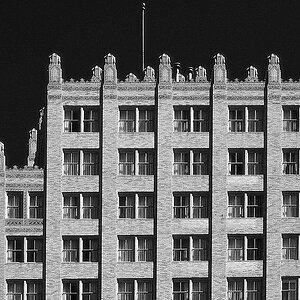- Joined
- Jun 2, 2013
- Messages
- 4,493
- Reaction score
- 4,141
I've noticed a trend with photographers that seems to happen every year during the holidays that's been on my mind lately. What I often see and hear is photographers complaining about people who aren't photographers getting cameras as gifts for the holidays and wanting to then become photographers. I remember when I got my first camera, a Canon Rebel XTi, 8 years ago. It was so exciting to dive headfirst into photography without knowing ANYTHING about it. I loved it right away and that passion has only gotten stronger. There are a lot of cynical veteran photographers who love voicing their negative opinions of these people every year. I don't share that outlook, so I'm not here to discourage you. Instead I would like to offer some advice from my perspective and some encouragement instead.
First of all, don't ever let other photographers discourage you. You need to have some thick skin, because there are many who will take pleasure in trying to cut others down and want nothing more than to convince you to sell your camera setup and buy a model airplane instead. Don't listen to these people. Instead, listen to those who encourage you and try to help you improve by giving you advice to do so. There will likely be times that someone offers you help and instead you may be hurt by the truth, and for lack of a better term you get butthurt. This is ok, it means you care about your photos and your photos are personal to you. You'll grow some thick skin though and learn to selectively take advice, apply it, and become a better photographer. Stay positive and always be open to improvement.
Find ways to educate yourself. One of the many beautiful things about photography is that you don't need to go to school to learn how to be an amazing photographer. There are numerous forums and groups online dedicated to teaching you how to be an amazing photographer, for free. There are also great online resources like Creativelive.com, as well as many others. Creativelive makes video tutorials by recording photo shoots and retouching sessions with some of the most amazing photographers in the industry. Check their streaming schedule, because these videos are free to stream the day they are recording them live. In my experience these resources have taught me so much and have been essential in my growth as a photographer. All you need is to have the desire to learn and a passion to become a better photographer. One thing photography has in common with other trades and skills is that we will without a doubt become better at our craft so long as we want to improve and we keep doing it. It's a love for the craft that is absolutely necessary, because you will put away a LOT of time and energy toward this. Very few are gifted enough to just pick up a camera and know exactly what to do without practice or education. You will be good some day, but there is work involved in getting there.
Shoot often. You will absolutely learn the most by getting experience with your camera. Every single time I do a photoshoot I learn and I improve. That aspect of photography never ends. Repeat my "mantra": Just keep shooting, just keep shooting, just keep learning, just keep learning...
Set your goals high. If you want to be the next Annie Leibovitz or _________, set your goal and start working towards it. Sometimes you'll feel discouraged, overwhelmed, scared, and you will inevitably have to take some risks if you want to be a great photographer. You will hear a lot of "NO", but there will also be some "yes"'s in there as well, and sometimes one big risk and a "yes" will really pay off. Even if you're scared, sometimes you just have face the fear and prove your doubts wrong in order to achieve your goals.
Set your standards high. Inspiration is important, and I recommend setting your standard of good work very high. Learn the names of the great photographers from the past and present, and view their work often. This is where you should be setting the bar for your own work. Don't just try to be better than your cousin or friend who just picked up a camera as well, try to be better than the greats. Some of my biggest inspirations are: Lara Jade, Michael Thompson, Bruce Weber, Robert Trachtenberg, Mario Testino, Irving Penn, Richard Avedon, Steven Meisel, Joey L. (Lawrence), and Annie Leibovitz. There's a good chance you've heard these names before or you've seen their photos more than once in your lifetime. In my opinion they represent the best in portrait and fashion photography. You will only be doing yourself a big favor by setting your standards to their level and higher, and the same can be said for the greats in other genres of photography.
Learn as much as you can about LIGHT! Without light, there just isn't a photo, so it stands to reason that lighting is the single most important aspect of photography. The more you know about it, the better your photos will look. Light is what sculpts and shapes the features of the subject so that the camera can render an image. You can even use light as a portrait retouching tool by emulating the makeup concept of highlighting and contouring (example here ), effectively reducing the amount of work needed in post production, and sometimes completely eliminating the need for retouching altogether. Light is of the highest importance.
Try getting the shot perfect at the moment of exposure, and try not to rely on editing to fix mistakes that you yourself (or a good assistant, MUA, hair stylist, wardrobe stylist, etc) can fix right there before you take the photo. The fact that it will save you some effort and time while editing is one reason for this, but in my opinion if you plan to edit your photos you will get the best results when editing the best photos.
On the topic of photo editing, my personal belief is that in most cases a little bit of editing goes a lot further and says a lot more than over-editing your photos. My personal goal when editing one of my portraits is to use editing to enhance what's already good, but to still make sure that it looks like it hasn't been edited. This is purely my personal view after many years of experimenting with different styles and levels of editing. In no way am I saying that you should never do a lot of editing if that's what you like, and you should especially experiment with doing so. Inevitably you will find your own style through this process, and for me I came to like minimal editing and impeccable lighting.
You are not as limited by your gear as you may think you are. To capture an exceptional image, you need a good subject to capture in the first place and you need to know how to make the best of the lighting you have available to you. Some of my favorite portraits that I feel represent some of my best work were lit using old table lamps with bulbs meant for household use, or portraits that I used fluorescent bulbs installed in public parking garages (see here and here ). The light source doesn't matter, the way you use the light to shape your subject and sculpt the best features of the subject is what matters. Posing and composition matter. Shape and form are an important factor in image composition, and being able to select a pose or composition that best compliments the subject of the photo is important. What isn't important is that you only spent $120 on a little 50mm prime lens and just maybe you only have an old used DSLR or film SLR, because that cheap little bargain lens is capable of rendering absolutely beautiful photos on any working camera with a knowledgeable photographer using it. The same can be said for that kit lens your camera might have come with. I shoot with a $300 lens, a $300 camera from 2008, and a $12 5-in-1 reflector, yet my lack of expensive gear has never prevented me from being hired, being published many times, and winning multiple awards. Don't ever believe that more expensive gear is what you need in order to be a better photographer, because it just isn't true. This isn't to say that the RIGHT gear isn't necessary though; a 200mm lens is not the right choice for wide landscape photos because of it's narrow field of view, nor is a 14mm lens the right choice for actor's headshots because of the high amount of feature distortion caused by the very wide field of view. Basically what I'm saying is that your knowledge of the craft matters 100% more than the cost or brand name of the gear you are using. To be a professional photographer you do NOT need high end gear. Obviously some clients will require high end gear such as medium format cameras for high end ad campaigns and such, but a high end client like that should provide you with the means to rent said gear if it's that important, or you can include the cost of rental in your total cost and invoice it to them.
You can be a professional photographer if you want to. There are many photographers out there who get bent out of shape over new photographers going pro, but I am not one of them. Being a professional is separate from being a great photographer in my opinion (although I personally recommend aiming for both). Similar to becoming a great photographer, experience is necessary to become a great professional. You'll need to learn marketing and other aspects of business that are unrelated to the craft of photography. If being a professional photographer is your goal, get started as soon as you can. I and many others are on your side, we want to see you do well, and we will help and encourage you as much as we are able to. Let the haters snarl and bark, you just smile back and keep a distance from them.
Stay off the railroad tracks. Almost every beginner is for some reason drawn to doing photo shoots on railroad tracks, and what you need to understand is that it's both deadly and illegal. It's a fact that people are killed by trains every year while doing photo shoots on tracks. You assume you would hear or see the train long before it get's close, but that assumption is untrue. Trains are faster than you think and in MANY cases people don't see them coming until it's dangerously close. The cliche photos you would get are NOT worth the risks.
I encourage others to give advice or opinions as well.
First of all, don't ever let other photographers discourage you. You need to have some thick skin, because there are many who will take pleasure in trying to cut others down and want nothing more than to convince you to sell your camera setup and buy a model airplane instead. Don't listen to these people. Instead, listen to those who encourage you and try to help you improve by giving you advice to do so. There will likely be times that someone offers you help and instead you may be hurt by the truth, and for lack of a better term you get butthurt. This is ok, it means you care about your photos and your photos are personal to you. You'll grow some thick skin though and learn to selectively take advice, apply it, and become a better photographer. Stay positive and always be open to improvement.
Find ways to educate yourself. One of the many beautiful things about photography is that you don't need to go to school to learn how to be an amazing photographer. There are numerous forums and groups online dedicated to teaching you how to be an amazing photographer, for free. There are also great online resources like Creativelive.com, as well as many others. Creativelive makes video tutorials by recording photo shoots and retouching sessions with some of the most amazing photographers in the industry. Check their streaming schedule, because these videos are free to stream the day they are recording them live. In my experience these resources have taught me so much and have been essential in my growth as a photographer. All you need is to have the desire to learn and a passion to become a better photographer. One thing photography has in common with other trades and skills is that we will without a doubt become better at our craft so long as we want to improve and we keep doing it. It's a love for the craft that is absolutely necessary, because you will put away a LOT of time and energy toward this. Very few are gifted enough to just pick up a camera and know exactly what to do without practice or education. You will be good some day, but there is work involved in getting there.
Shoot often. You will absolutely learn the most by getting experience with your camera. Every single time I do a photoshoot I learn and I improve. That aspect of photography never ends. Repeat my "mantra": Just keep shooting, just keep shooting, just keep learning, just keep learning...
Set your goals high. If you want to be the next Annie Leibovitz or _________, set your goal and start working towards it. Sometimes you'll feel discouraged, overwhelmed, scared, and you will inevitably have to take some risks if you want to be a great photographer. You will hear a lot of "NO", but there will also be some "yes"'s in there as well, and sometimes one big risk and a "yes" will really pay off. Even if you're scared, sometimes you just have face the fear and prove your doubts wrong in order to achieve your goals.
Set your standards high. Inspiration is important, and I recommend setting your standard of good work very high. Learn the names of the great photographers from the past and present, and view their work often. This is where you should be setting the bar for your own work. Don't just try to be better than your cousin or friend who just picked up a camera as well, try to be better than the greats. Some of my biggest inspirations are: Lara Jade, Michael Thompson, Bruce Weber, Robert Trachtenberg, Mario Testino, Irving Penn, Richard Avedon, Steven Meisel, Joey L. (Lawrence), and Annie Leibovitz. There's a good chance you've heard these names before or you've seen their photos more than once in your lifetime. In my opinion they represent the best in portrait and fashion photography. You will only be doing yourself a big favor by setting your standards to their level and higher, and the same can be said for the greats in other genres of photography.
Learn as much as you can about LIGHT! Without light, there just isn't a photo, so it stands to reason that lighting is the single most important aspect of photography. The more you know about it, the better your photos will look. Light is what sculpts and shapes the features of the subject so that the camera can render an image. You can even use light as a portrait retouching tool by emulating the makeup concept of highlighting and contouring (example here ), effectively reducing the amount of work needed in post production, and sometimes completely eliminating the need for retouching altogether. Light is of the highest importance.
Try getting the shot perfect at the moment of exposure, and try not to rely on editing to fix mistakes that you yourself (or a good assistant, MUA, hair stylist, wardrobe stylist, etc) can fix right there before you take the photo. The fact that it will save you some effort and time while editing is one reason for this, but in my opinion if you plan to edit your photos you will get the best results when editing the best photos.
On the topic of photo editing, my personal belief is that in most cases a little bit of editing goes a lot further and says a lot more than over-editing your photos. My personal goal when editing one of my portraits is to use editing to enhance what's already good, but to still make sure that it looks like it hasn't been edited. This is purely my personal view after many years of experimenting with different styles and levels of editing. In no way am I saying that you should never do a lot of editing if that's what you like, and you should especially experiment with doing so. Inevitably you will find your own style through this process, and for me I came to like minimal editing and impeccable lighting.
You are not as limited by your gear as you may think you are. To capture an exceptional image, you need a good subject to capture in the first place and you need to know how to make the best of the lighting you have available to you. Some of my favorite portraits that I feel represent some of my best work were lit using old table lamps with bulbs meant for household use, or portraits that I used fluorescent bulbs installed in public parking garages (see here and here ). The light source doesn't matter, the way you use the light to shape your subject and sculpt the best features of the subject is what matters. Posing and composition matter. Shape and form are an important factor in image composition, and being able to select a pose or composition that best compliments the subject of the photo is important. What isn't important is that you only spent $120 on a little 50mm prime lens and just maybe you only have an old used DSLR or film SLR, because that cheap little bargain lens is capable of rendering absolutely beautiful photos on any working camera with a knowledgeable photographer using it. The same can be said for that kit lens your camera might have come with. I shoot with a $300 lens, a $300 camera from 2008, and a $12 5-in-1 reflector, yet my lack of expensive gear has never prevented me from being hired, being published many times, and winning multiple awards. Don't ever believe that more expensive gear is what you need in order to be a better photographer, because it just isn't true. This isn't to say that the RIGHT gear isn't necessary though; a 200mm lens is not the right choice for wide landscape photos because of it's narrow field of view, nor is a 14mm lens the right choice for actor's headshots because of the high amount of feature distortion caused by the very wide field of view. Basically what I'm saying is that your knowledge of the craft matters 100% more than the cost or brand name of the gear you are using. To be a professional photographer you do NOT need high end gear. Obviously some clients will require high end gear such as medium format cameras for high end ad campaigns and such, but a high end client like that should provide you with the means to rent said gear if it's that important, or you can include the cost of rental in your total cost and invoice it to them.
You can be a professional photographer if you want to. There are many photographers out there who get bent out of shape over new photographers going pro, but I am not one of them. Being a professional is separate from being a great photographer in my opinion (although I personally recommend aiming for both). Similar to becoming a great photographer, experience is necessary to become a great professional. You'll need to learn marketing and other aspects of business that are unrelated to the craft of photography. If being a professional photographer is your goal, get started as soon as you can. I and many others are on your side, we want to see you do well, and we will help and encourage you as much as we are able to. Let the haters snarl and bark, you just smile back and keep a distance from them.
Stay off the railroad tracks. Almost every beginner is for some reason drawn to doing photo shoots on railroad tracks, and what you need to understand is that it's both deadly and illegal. It's a fact that people are killed by trains every year while doing photo shoots on tracks. You assume you would hear or see the train long before it get's close, but that assumption is untrue. Trains are faster than you think and in MANY cases people don't see them coming until it's dangerously close. The cliche photos you would get are NOT worth the risks.
I encourage others to give advice or opinions as well.
Last edited:


